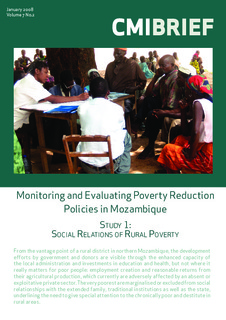| dc.contributor.author | Paulo, Margarida | |
| dc.contributor.author | Rosário, Carmeliza | |
| dc.contributor.author | Tvedten, Inge | |
| dc.date.accessioned | 2018-01-04T08:17:30Z | |
| dc.date.issued | 2008-02-01 | |
| dc.identifier | oai:www.cmi.no:2939 | |
| dc.identifier.citation | Bergen: Chr. Michelsen Institute (CMI Brief vol. 7 no. 2) 4 p. | |
| dc.identifier.issn | 0809-6732 | |
| dc.identifier.issn | 0809-6732 | |
| dc.identifier.uri | http://hdl.handle.net/11250/2474761 | |
| dc.description.abstract | From the vantage point of a rural district in northern Mozambique, the development efforts by government and donors are visible through the enhanced capacity of the local administration and investments in education and health, but not where it really matters for poor people: employment creation and reasonable returns from their agricultural production, which currently are adversely affected by an absent or exploitative private sector. The very poorest are marginalised or excluded from social relationships with the extended family, traditional institutions as well as the state, underlining the need to give special attention to the chronically poor and destitute in rural areas. | |
| dc.language.iso | eng | |
| dc.publisher | Chr. Michelsen Institute | |
| dc.relation | CMI Brief | |
| dc.relation | 2 | |
| dc.relation.ispartof | CMI Brief | |
| dc.relation.ispartofseries | CMI Brief vol. 7 no. 2 | |
| dc.relation.ispartofseries | CMI Brief vol. 7 no. 2 | |
| dc.relation.uri | https://www.cmi.no/publications/2939-social-relations-of-rural-poverty | |
| dc.subject | Mozambique | |
| dc.title | Monitoring and Evaluating Poverty Reduction Policies in Mozambique. Study 1: Social Relations of Rural Poverty | |
| dc.type | Report | |
